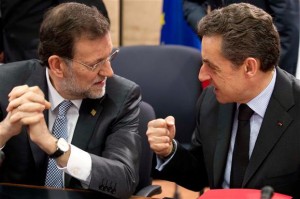
If we have learnt anything about Spain’s new prime minister, Mariano Rajoy, since he took power in December, it’s that his reputation for being anything but straightforward when conveying his intentions is well deserved. Rajoy has often been portrayed as the embodiment of retranca, a tendency his fellow Galicians are known for to answer questions with ambiguity and multiple meanings. The first two months of his tenure have seen Rajoy behave every bit like the stereotypical Galician.
An early example of this was when the prime minister deployed his front-line ministers to announce a major tax increase, just days after himself announcing that “my intention is not to raise taxes.”
And now Rajoy has taken his smoke and mirrors to Brussels. After weeks of telling anyone who would listen that Spain would fulfil its economic targets agreed with the EU – namely to bring the public deficit down to 4.4 percent of GDP this year – Rajoy told reporters in Brussels on Friday that in fact he is aiming for 5.8 percent.
“This is a sovereign decision that Spain has taken,” he said, underlining the fact that he apparently did not consult with Angela Merkel during their head-to-head beforehand.
This rabbit out of the hat was clearly a surprise for the rest of the EU and for Merkel. But it makes perfect sense from Rajoy’s point of view. Cutting the deficit from 8.5 percent to 4.4 percent would be a monumental challenge for any economy, not least one that is facing a contraction of around 1.7 percent this year.
A commonly held perception when he took power was that Merkel would be doing much of Spain’s economic policymaking from afar, with Rajoy doing little more than taking orders. Back home, this unilateral shifting of the goalposts makes the prime minister look more proactive, even though he has pledged to maintain the 2013 deficit target of 3.0 percent of GDP. And while Merkel and the EU’s policy hawks may not like it, the notion that Spain is “too big to be allowed to fail” gives it some margin, as does the battery of structural reforms that Rajoy is pushing through.
A friend in Hollande?
The conservative Spanish leader may also take heart from the recent anti-cuts current among European leaders, as well as, ironically, the strong showing of Socialist candidate François Hollande in the French presidential campaign. Hollande’s attitude to EU-imposed fiscal discipline means that soon, Spain might not be alone in its defiance of deficit targets.
An opinion poll published in El País newspaper at the weekend suggested that while Rajoy’s popularity is in decline, backing for his Partido Popular has risen slightly since the November election victory. This will give the government heart as it continues to push through the controversial labour reform and implement spending cuts.
But the retranca could soon lose its currency as circumstances dictate that Rajoy be more straightforward with both the Spanish electorate and his European counterparts. If not, both could start to lose patience.
The government has refused to reveal details of the 2012 budget until the end of March. Its argument, that it needs all that time to prepare the paperwork, is barely believable; the real reason, it seems, is that the Partido Popular wants to secure a first-ever win in the Socialist stronghold of Andalusia in regional elections on March 25, before unveiling a barrage of deeply unpopular cuts.
No doubt, it won’t be Rajoy himself who faces the cameras to deliver that bad news to Spaniards – that wouldn’t be his style. But come April, even the prime minister will find he has to do some straight talking.
Guy, my understanding is that ‘retranca’ is the Galician sense of humour. Something like sarcastic irony. Or ironic sarcasm. I’m not sure Señor Rajoy has treated us to any examples of this, being an apparently humourless individual.
Colin, true, you don’t get many gags out of him. My dictionary does give the definition: “Hidden or feigned intention in expressing oneself”, but the Galician sense doesn’t get mentioned.